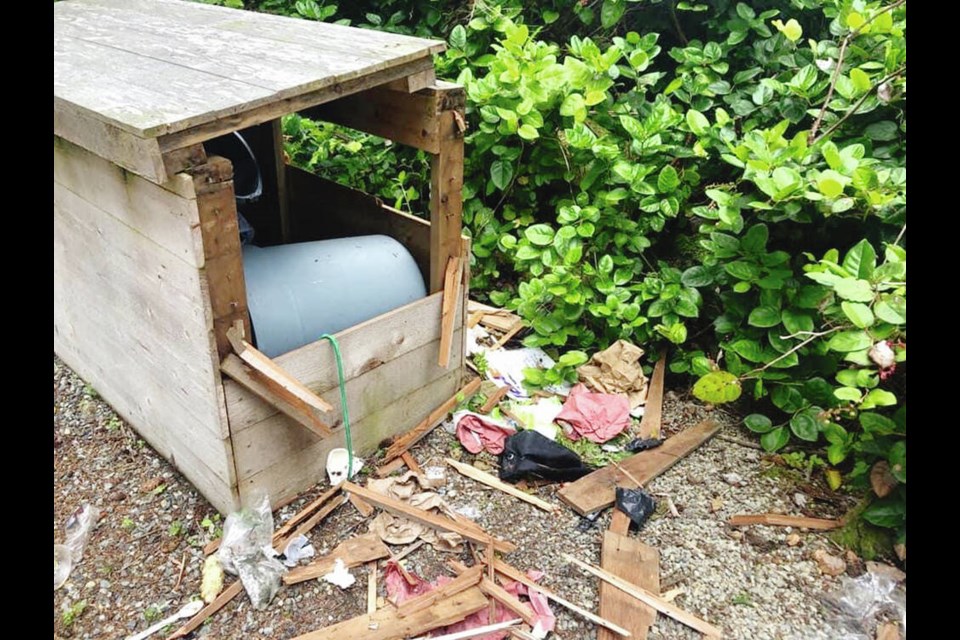Fourteen black bears have been destroyed in the Ucluelet and Tofino areas this year in what one observer describes as a “perfect storm” of increasing conflicts between the bruins and humans.
“It’s the worst I’ve ever seen,” said Bob Hansen, a retired national park ranger and Pacific Rim co-ordinator for WildSafeBC, which aims to prevent conflicts between humans and wildlife.
Only two black bears had to be destroyed last year, said Hansen, who has lived in the area for three decades.
He said record-breaking temperatures over the summer — including a heat dome for a week in late June — destroyed inland berry crops and drove higher numbers of bears to the fog zone along the coast, where salal berries were flourishing.
The bears, which “follow their nose,” then started gravitating to more easy pickings like garbage, chicken coops, bird feeders and outdoor pet food and freezer units in their new territory, said Hansen.
Worsening the problem was a record number of tourists in the region this summer and fall — estimated at more than one million — which produced an exceptional amount of waste that overflowed from garbage cans and other containers, said Hansen.
He said bears were spotted this fall inside grease-waste containers behind local restaurants and foraging in unsecured commercial bins.
Many guests staying at vacation rentals unwittingly added to the problem by putting out trash days before normal pickups.
Lower-than-expected salmon runs in local rivers are also playing a role.
Now the bears are ranging Tofino and Ucluelet “night and day” because of the natural urge to fatten up before hibernating, Hanson said, noting garbage is an easier food source than looking for berries or wading in streams for salmon.
The Conservation Officer Service has reported more than 330 calls about bears this year in the Pacific Rim region, a 425 per cent increase from last year.
All of the animals that were shot had lost their fear of humans and relied on garbage as food, rendering them poor candidates for relocation.
Although most residents and businesses of Tofino and Ucluelet are doing their best to avoid attracting bears, Hansen said the bruins have become increasingly aggressive about getting the food.
“People have been diligent about putting their trash out the day of pickup. That has improved,” said Hansen.
But putting garbage “out of sight of the bear” doesn’t solve the problem.
Hansen said 24 sheds were ripped open and ransacked in Ucluelet and Tofino this year — “metal, plastic, wooden, even if they’re locked, it doesn’t matter.”
One resident placed garbage in the back of a covered pickup, but that didn’t stop a bear from tearing the door off.
And a backyard holiday trailer in Tofino wasn’t much of a garbage shelter, either. “The bear just tore the wall off of that,” said Hansen. “They are highly intelligent, persistent and have a great amount of strength … even a small bear is exceptionally strong.”
Twelve chicken coops have also been raided this year, and compost piles and bins remain a huge problem. Grants are available for homeowners to put up electric fences around some of these areas.
Even outdoor locked freezers are no match for a hungry bear, said Hansen.
While many people believe a bear can’t get into a metal container, he said he has received reports of bears tearing off lids and clawing through the sides.
Conservation officers have been doing regular garbage audits and public awareness education with WildSafeBC is ongoing, but Hansen said more bylaw enforcement and fines are needed to stem the “chronic problems” of attracting bears.
While there haven’t been any bear attacks, Hansen said as long as bears continue to roam Tofino and Ucluelet, it raises risks for human safety.
A fisherman on Kootowis Creek near Tofino was knocked over by a bear on Oct. 15. He wasn’t injured and managed to scare the bruin away.
The Environment Ministry said the Conservation Officer Service has destroyed 364 black bears since April, which doesn’t include more than 100 shot by landowners and others who reported them.
In September alone, a total of 164 black bears were put down throughout the province — the third highest total for September over the last decade.
October is expected to be even worse, as bears consume up to 20,000 calories a day to create layers of fat to get them through months of hibernation ahead.
dkloster@timescolonist.com



